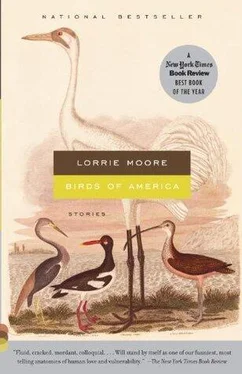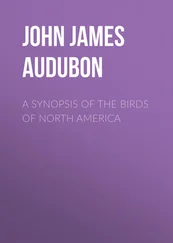“Wrong team, Mom,” says Therese, and her mother says “Oops,” and turns around. She repeats the famous person stance.
“Famous person,” says Ray encouragingly. Therese’s mother nods. She pauses for a bit to think. Then she spins around, throws her arms up into the air, collapses forward onto the floor, then backward, hitting her head on the stereo.
“Marjorie, what are you doing?” asks Therese’s father. Her mother is lying there on the floor, laughing.
“Are you okay?” Therese asks. Her mother nods, still laughing quietly.
“Fall,” says Ray. “Dizziness. Dizzy Gillespie.”
Therese’s mother shakes her head.
“Epilepsy,” says Therese.
“Explode,” says her father, and her mother nods. “Explosion. Bomb. Robert Oppenheimer!”
“That’s it.” Her mother sighs. She has a little trouble getting back up. She is seventy and her knees are jammed with arthritis.
“You need help, Mom?” Therese asks.
“Yeah, Mom, you need help?” asks Ann, who has risen and walked toward the center of the room, to take charge.
“I’m okay.” Therese’s mother sighs, with a quiet, slightly faked giggle, and walks stiffly back to her seat.
“That was great, Ma,” says Therese.
Her mother smiles proudly. “Well, thank you!”
After that, there are many rounds, and every time Therese’s mother gets anything like Dom De Luise or Tom Jones, she does her bomb imitation again, whipping herself into a spastic frenzy and falling, then rising stiffly again to great applause. Pam brings Winnie in from her nap and everyone oohs and aahs at the child’s sweet sleep-streaked face. “There she is,” coos Aunt Therese. “You want to come see Grandma be a bomb?”
“It’s your turn,” says Andrew impatiently.
“Mine?” asks Therese.
“I think that’s right,” says her father.
She gets up, digs into the bowl, unfolds the scrap of wrapping paper. It says “Jekylls Street.” “I need a consultation here. Andrew, I think this is your writing.”
“Okay,” he says, rising, and together they step into the foyer.
“Is this a TV show?” whispers Therese. “I don’t watch much TV.”
“No,” says Andrew with a vague smile.
“What is it?”
He shifts his weight, reluctant to tell her. Perhaps it is because he is married to a detective. Or, more likely, it is because he himself works with Top Secret documents from the Defense Department; he was recently promoted from the just plain Secret ones. As an engineer, he consults, reviews, approves. His eyes are suppressed, annoyed. “It’s the name of a street two blocks from here.” There’s a surly and defensive curve to his mouth.
“But that’s not the title of anything famous.”
“It’s a place. I thought we could do names of places.”
“It’s not a famous place.”
“So?”
“I mean, we all could write down the names of streets in our neighborhoods, near where we work, a road we walked down once on the way to a store—”
“You’re the one who said we could do places.”
“I did? Well, all right, then, what did I say was the sign for a place? We don’t have a sign for places.”
“I don’t know. You figure it out,” he says. A saucy rage is all over him now. Is this from childhood? Is this from hair loss? Once, she and Andrew were close. But now, as with Ann, she has no idea who he is anymore. She has only a theory: an electrical engineer worked over years ago by high school guidance counselors paid by the Pentagon to recruit, train, and militarize all the boys with high math SAT scores. “From M.I.T. to MIA,” Andrew once put it himself. “A military-industrial asshole.” But she can’t find that satirical place in him anymore. Last year, at least, they had joked about their upbringing. “I scarcely remember Dad reading to us,” she’d said.
“Sure he read to us,” said Andrew. “You don’t remember him reading to us? You don’t remember him reading to us silently from the Wall Street Journal ?”
Now she scans his hardening face for a joke, a glimmer, a bit of love. Andrew and Ann have seemed close, and Therese feels a bit wistful, wondering when and how that happened. She is a little jealous. The only expression she can get from Andrew is a derisive one. He is a traffic cop. She is the speeding flower child.
Don’t you know I’m a judge ? she wants to ask. A judge via a fluke political appointment, sure. A judge with a reputation around the courthouse for light sentencing, true. A judge who is having an affair that mildly tarnishes her character — okay. A softy; an easy touch: but a judge nonetheless.
Instead, she says, “Do you mind if I just pick another one?”
“Fine by me,” he says, and strides brusquely back into the living room.
Oh, well, Therese thinks. It is her new mantra. It usually calms her better than ohm , which she also tries. Ohm is where the heart is. Ohm is not here. Oh, well. Oh, well . When she was first practicing law, to combat her courtroom stage fright, she would chant to herself, Everybody loves me. Everybody loves me , and when that didn’t work, she’d switch to Kill! Kill! Kill!
“We’re doing another one,” announces Andrew, and Therese picks another one.
A book and a movie. She opens her palms, prayerlike for a book. She cranks one hand in the air for a movie. She pulls on her ear and points at a lamp. “Sounds like light ,” Ray says. His expression is open and helpful. “Bite, kite, dite, fight, night—”
Therese signals yes, that’s it.
“Night,” repeats Ray.
“Tender Is the Night,” says her mother.
“Yes!” says Therese, and bends to kiss her mother on the cheek. Her mother smiles exuberantly, her face in a kind of burst; she loves affection, is hungry and grateful for it. When she was younger, she was a frustrated, mean mother, and so she is pleased when her children act as if they don’t remember.
It is Andrew’s turn. He stands before his own team, staring at the red scrap in his hand. He ponders it, shakes his head, then looks back toward Therese. “This must be yours,” he says with a smirk that maybe is a good-natured smirk. Is there such a thing? Therese hopes.
“You need a consultation?” She gets up to look at the writing; it reads, “The Surrey with the Fringe on Top.” “Yup, that’s mine,” she says.
“Come here,” he says, and the two of them go back down the corridor toward the foyer again. This time, Therese notices the photographs her parents have hung there. Photographs of their children, of weddings and Winnie, though all the ones of Therese seem to her to be aggressively unflattering, advertising an asymmetry in her expression, or the magnified haziness of her eyes, her hair in a dry, peppery frizz. Vanity surges in her: surely there must have been better pictures! The ones of Andrew, of Ann, of Tad, of Pam and Winnie are sunlit, posed, wholesome, pretty. But the ones of Therese seem slightly disturbed, as if her parents were convinced she is insane.
“We’ll stand here by the demented-looking pictures of me,” says Therese.
“Ann sent her those,” says Andrew.
“Really?” says Therese.
He studies her hair. “Didn’t your hair used to be a different color? I don’t remember it ever being quite that color. What is that color?”
“Why, whatever do you mean?”
“Look,” he says, getting back to the game. “I’ve never heard of this,” and he waves the scrap of paper as if it were a gum wrapper.
“You haven’t? It’s a song: ‘Geese and chicks and ducks better scurry, when I take you out in the surrey …’ ”
“No.”
Читать дальше












